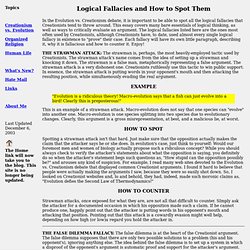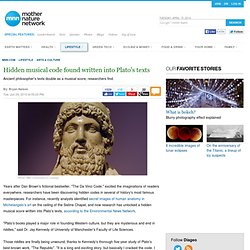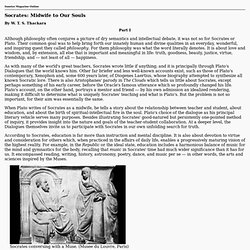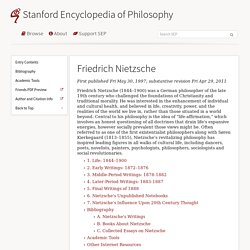

Welcome to PhilSci-Archive - PhilSci-Archive. Logical Fallacies and How to Spot Them. Logical Fallacies and How to Spot Them In the Evolution vs.

Creationism debate, it is important to be able to spot all the logical fallacies that Creationists tend to throw around. This essay covers many bare essentials of logical thinking, as well as ways to critically evaluate an argument. The logical fallacies listed here are the ones most often used by Creationists, although Creationists have, to date, used almost every single logical fallacy in existence to "prove" their case. Each fallacy will have its own little paragraph, describing it, why it is fallacious and how to counter it. THE STRAWMAN ATTACK: The strawman is, perhaps, the most heavily-employed tactic used by Creationists. "Evolution is a ridiculous theory!
This is an example of a strawman attack. Spotting a strawman attack isn't that hard. Strawman attacks, once exposed for what they are, are not all that difficult to counter. THE FALSE DILEMMA FALLACY: The false dilemma is at the heart of the Creationist argument. Hidden musical code found written into Plato's texts. "Plato’s books played a major role in founding Western culture, but they are mysterious and end in riddles," said Dr.

Jay Kennedy of University of Manchester's Faculty of Life Sciences. Those riddles are finally being unwound, thanks to Kennedy's thorough five-year study of Plato's best-known work, "The Republic". "It is a long and exciting story, but basically I cracked the code. I have shown rigorously that the books do contain codes and symbols and that unraveling them reveals the hidden philosophy of Plato. " So what great wisdom does the secret message reveal? Plato was influenced by Pythagoras, another ancient Greek philosopher and mathematician who is perhaps best known for discovering the Pythagorean Theorem. Kennedy discovered that Plato had placed clusters of words related to music in his master work, which can be broken into 12 equal sections — a pattern he suspected was related to the twelve notes of the Greek musical scale.
Philosophy Timeline. Socrates: Midwife to Our Souls by W. T. S. Thackara. Socrates: Midwife to Our Souls By W.

T. S. Thackara Part I Although philosophy often conjures a picture of dry semantics and intellectual debate, it was not so for Socrates or Plato. As with many of the world's great teachers, Socrates wrote little if anything; and it is principally through Plato's Dialogues that the world knows him. When Plato writes of Socrates as a midwife, he tells a story about the relationship between teacher and student, about education, and about the birth of spiritual-intellectual fire in the soul. According to Socrates, education is far more than instruction and mental discipline. Socrates conversing with a Muse.
Besides the regular curriculum, there is also a special lifelong training for those who show an aptitude for philosophy, those who are truly "lovers of wisdom. " *See “The Gnosis according to Plato,” Sunrise, August/September 1986. *Second Letter, §314. It is because you say that you always have a divine guide, Socrates. Part 2. An Error Occurred Setting Your User Cookie. An Error Occurred Setting Your User Cookie. An Error Occurred Setting Your User Cookie. Plato's Socrates. Logical Fallacies and How to Spot Them. Western Philosophy. Friedrich Nietzsche. 1.

Life: 1844–1900 In the small German village of Röcken bei Lützen, located in a rural farmland area southwest of Leipzig, Friedrich Wilhelm Nietzsche was born at approximately 10:00 a.m. on October 15, 1844. The date coincided with the 49th birthday of the Prussian King, Friedrich Wilhelm IV, after whom Nietzsche was named, and who had been responsible for Nietzsche's father's appointment as Röcken's town minister.
Nietzsche's uncle and grandfathers were also Lutheran ministers, and his paternal grandfather, Friedrich August Ludwig Nietzsche (1756–1826), was further distinguished as a Protestant scholar, one of whose books (1796) affirmed the “everlasting survival of Christianity.” When Nietzsche was nearly 5 years old, his father, Karl Ludwig Nietzsche (1813–1849) died from a brain ailment (July 30, 1849) and the death of Nietzsche's two-year-old brother, Ludwig Joseph, traumatically followed six months later (January 4, 1850). 2. 3. Internet Encyclopedia of Philosophy.